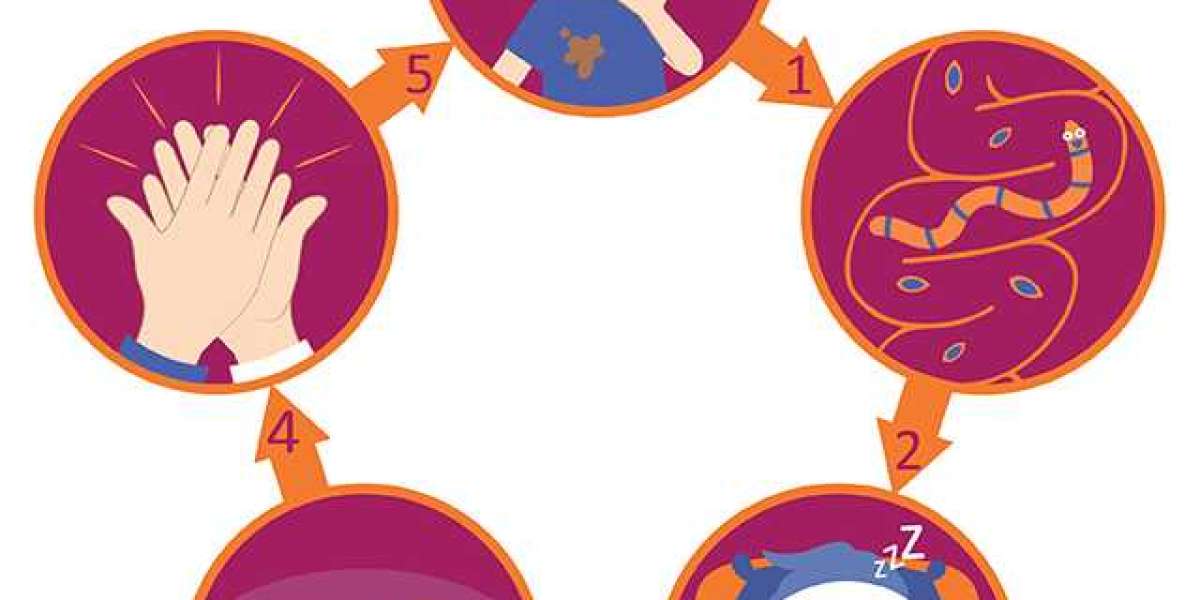Threadworms, also known as pinworms (scientifically referred to as Enterobius vermicularis), are intestinal parasites that cause infections in humans, particularly in children. The primary treatment for threadworm infections is the use of antiparasitic medications such as Zentel (Albendazole), commonly prescribed in a 400 mg dose. Zentel is highly effective at eradicating threadworms by inhibiting their ability to absorb nutrients, eventually killing them. Understanding the threadworm lifecycle is crucial to prevent reinfection and ensure complete treatment.
Let's break down the five stages of the threadworm lifecycle and see how Zentel 400 mg works against them.
Egg Stage
The threadworm lifecycle begins when a person accidentally ingests the microscopic eggs, usually by transferring them from contaminated surfaces (e.g., bedding, clothing, or food) to their mouth. These eggs are resilient and can survive in the environment for up to two weeks, making them easy to spread within households or schools. The eggs are often invisible to the naked eye, further complicating efforts to prevent infection.
Once inside the digestive system, the eggs move to the small intestine, where they hatch into larvae. Zentel's action targets the metabolic processes of the larvae, though the medication is more effective once the worms have matured.
Larval Stage
After ingestion, threadworm eggs hatch into larvae in the small intestine within a few hours. These larvae are tiny and undetectable but immediately begin their journey toward the large intestine, where they will mature into adult worms. The larval stage is short-lived but critical to the lifecycle because the larvae will develop rapidly into fully mature worms capable of laying eggs.
Zentel 400 mg is often prescribed in the early stages of infection to halt the development of larvae into adult worms. By inhibiting the parasites' ability to absorb glucose, the drug effectively starves the larvae, stopping them from becoming mature adults.
Adult Worm Stage
Within 2 to 4 weeks of ingestion, the larvae mature into adult threadworms in the colon. Adult females are about 8-13 mm in length, and males are smaller, around 2-5 mm. Adult worms primarily reside in the large intestine, where they feed on the nutrients found in the gut. They are responsible for the classic symptoms of threadworm infection, such as intense itching around the anus, caused by the movement of the worms and their egg-laying activities.
Zentel works at this stage by targeting the adult worms directly. The medication causes the worms to die off, preventing them from reproducing and continuing the lifecycle.
Egg Laying Stage
The adult female threadworm lays her eggs around the anal area, usually at night. She can lay thousands of eggs, which are deposited in the perianal region. This is the most infectious stage of the lifecycle, as the eggs are highly contagious and can easily be transferred through scratching, clothing, or bedding.
Zentel kills the adult worms and interrupts their reproductive cycle, but since reinfection is common due to egg exposure, it is often necessary to repeat the treatment after two weeks. Preventing reinfection is essential, and hygiene measures, such as washing hands and changing bedding, are crucial during this stage.
Reinfection or Resolution
In untreated cases, threadworm infections can persist for months, with the eggs being constantly reintegrated into the body through poor hygiene practices. Without treatment like Zentel, the infection will continue, leading to ongoing discomfort and potential complications such as bacterial infections from excessive scratching.
When treated with Zentel 400 mg, the threadworm lifecycle is effectively broken. However, to prevent reinfection, a second dose is typically recommended two weeks after the initial treatment. This ensures any remaining eggs or newly hatched larvae are eliminated before they can reach adulthood.
Conclusion
Understanding the lifecycle of threadworms is key to preventing and treating infections effectively. Zentel 400 mg plays a critical role in disrupting the lifecycle, primarily by killing the adult worms and preventing them from laying eggs. Since reinfection is common, following good hygiene practices alongside medication is essential to fully eradicate the parasite.







